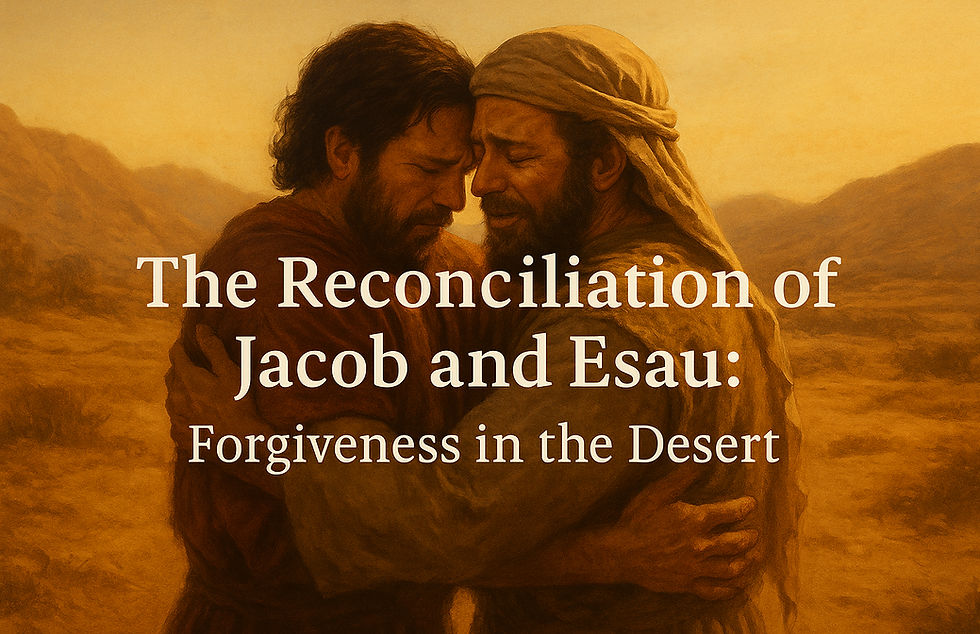Joseph and His Brothers’ Reconciliation: The Theology of Forgiveness
- Bible Believing Christian

- Sep 8, 2025
- 2 min read

Joseph and His Brothers’ Reconciliation: The Theology of Forgiveness
Genesis 42–45 brings the Joseph story to its emotional climax. The brothers who betrayed Joseph now stand before him in Egypt, unaware that the powerful governor is the brother they sold into slavery. What follows is a narrative of testing, repentance, and forgiveness that shows how God transforms guilt into grace.
The Brothers Come to Egypt
The famine spread across Canaan, forcing Jacob to send his sons to Egypt for grain. They bowed before Joseph (Genesis 42:6), unknowingly fulfilling the dreams they had once mocked. Joseph recognized them, but they did not recognize him.
Rather than revealing himself immediately, Joseph tested them. He accused them of being spies, held Simeon as collateral, and demanded they bring Benjamin to prove their honesty. These actions were not vengeance but designed to awaken their conscience.
The Weight of Guilt
The brothers’ words reveal their troubled hearts: “Truly we are guilty concerning our brother, because we saw the distress of his soul when he pleaded with us; yet we did not listen; therefore this distress has happened to us.” (Genesis 42:21, NASB). Years later, their guilt still haunted them. The famine was not only a physical trial but also a divine confrontation with their past sin.
The Final Test and Joseph’s Revelation
When Benjamin was brought to Egypt, Joseph showed kindness, yet tested their loyalty by placing his silver cup in Benjamin’s sack (Genesis 44). Judah, who once suggested selling Joseph, now offered himself in Benjamin’s place. This transformation proved that the brothers were no longer the same men who had betrayed him.
At last, Joseph could no longer restrain himself. He wept and declared: “I am Joseph! Is my father still alive?” (Genesis 45:3, NASB). His brothers were terrified, but Joseph reframed the entire narrative: “And now, do not be grieved or angry with yourselves because you sold me here, for God sent me ahead of you to save lives.” (Genesis 45:5, NASB).
Misconceptions: Was Joseph Excusing Their Sin?
Some misread Joseph’s words as excusing or minimizing the betrayal. But Joseph does not say the brothers were innocent—he says God worked through their evil. Their sin was real, but God’s providence was greater. Forgiveness does not erase sin; it reframes it in the light of God’s purposes.
Theological Reflection
This reconciliation shows us the anatomy of forgiveness: confrontation, repentance, transformation, and grace. Joseph’s tears reveal the cost of forgiveness—it is not cheap or easy. Yet it also shows the freedom that comes when bitterness is surrendered to God’s sovereignty.
Judah’s transformation is especially significant. Once he sold Joseph; now he offers himself in Benjamin’s place. From Judah’s line will come the Messiah, the ultimate substitute who offers Himself in our place.
Christ-Centered Conclusion
Joseph’s reconciliation with his brothers foreshadows the greater reconciliation accomplished in Christ. We, like the brothers, stand guilty and fearful before the One we have wronged. Yet Christ, like Joseph, says, “Do not be grieved… God sent me ahead of you to save lives.”
Forgiveness does not deny sin; it magnifies grace. Just as Joseph embraced those who betrayed him, Christ embraces those who once were His enemies. In Him, guilt is confronted, grace is offered, and reconciliation is complete.


